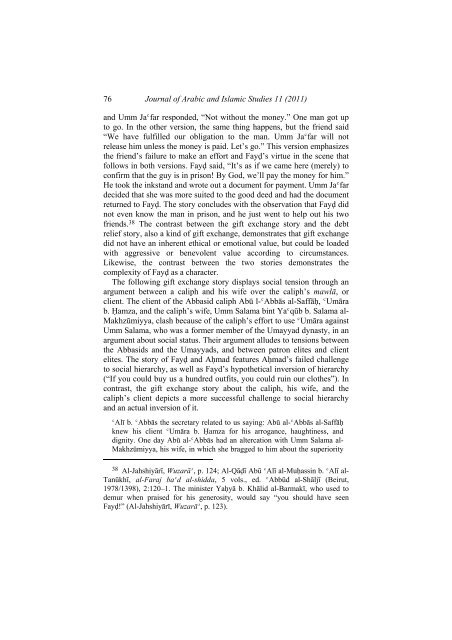JOURNAL OF ARABIC AND ISLAMIC STUDIES
JOURNAL OF ARABIC AND ISLAMIC STUDIES
JOURNAL OF ARABIC AND ISLAMIC STUDIES
You also want an ePaper? Increase the reach of your titles
YUMPU automatically turns print PDFs into web optimized ePapers that Google loves.
76<br />
Journal of Arabic and Islamic Studies 11 (2011)<br />
and Umm Jaʿfar responded, “Not without the money.” One man got up<br />
to go. In the other version, the same thing happens, but the friend said<br />
“We have fulfilled our obligation to the man. Umm Jaʿfar will not<br />
release him unless the money is paid. Let’s go.” This version emphasizes<br />
the friend’s failure to make an effort and Fayḍ’s virtue in the scene that<br />
follows in both versions. Fayḍ said, “It’s as if we came here (merely) to<br />
confirm that the guy is in prison! By God, we’ll pay the money for him.”<br />
He took the inkstand and wrote out a document for payment. Umm Jaʿfar<br />
decided that she was more suited to the good deed and had the document<br />
returned to Fayḍ. The story concludes with the observation that Fayḍ did<br />
not even know the man in prison, and he just went to help out his two<br />
friends. 38 The contrast between the gift exchange story and the debt<br />
relief story, also a kind of gift exchange, demonstrates that gift exchange<br />
did not have an inherent ethical or emotional value, but could be loaded<br />
with aggressive or benevolent value according to circumstances.<br />
Likewise, the contrast between the two stories demonstrates the<br />
complexity of Fayḍ as a character.<br />
The following gift exchange story displays social tension through an<br />
argument between a caliph and his wife over the caliph’s mawlā, or<br />
client. The client of the Abbasid caliph Abū l-ʿAbbās al-Saffāḥ, ʿUmāra<br />
b. Ḥamza, and the caliph’s wife, Umm Salama bint Yaʿqūb b. Salama al-<br />
Makhzūmiyya, clash because of the caliph’s effort to use ʿUmāra against<br />
Umm Salama, who was a former member of the Umayyad dynasty, in an<br />
argument about social status. Their argument alludes to tensions between<br />
the Abbasids and the Umayyads, and between patron elites and client<br />
elites. The story of Fayḍ and Aḥmad features Aḥmad’s failed challenge<br />
to social hierarchy, as well as Fayd’s hypothetical inversion of hierarchy<br />
(“If you could buy us a hundred outfits, you could ruin our clothes”). In<br />
contrast, the gift exchange story about the caliph, his wife, and the<br />
caliph’s client depicts a more successful challenge to social hierarchy<br />
and an actual inversion of it.<br />
ʿAlī b. ʿAbbās the secretary related to us saying: Abū al-ʿAbbās al-Saffāḥ<br />
knew his client ʿUmāra b. Ḥamza for his arrogance, haughtiness, and<br />
dignity. One day Abū al-ʿAbbās had an altercation with Umm Salama al-<br />
Makhzūmiyya, his wife, in which she bragged to him about the superiority<br />
38 Al-Jahshiyārī, Wuzarāʾ, p. 124; Al-Qāḍī Abū ʿAlī al-Muḥassin b. ʿAlī al-<br />
Tanūkhī, al-Faraj baʿd al-shidda, 5 vols., ed. ʿAbbūd al-Shāljī (Beirut,<br />
1978/1398), 2:120–1. The minister Yaḥyā b. Khālid al-Barmakī, who used to<br />
demur when praised for his generosity, would say “you should have seen<br />
Fayḍ!” (Al-Jahshiyārī, Wuzarāʾ, p. 123).

















